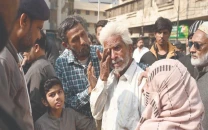A new system: The rise of the private sector
Public-run healthcare facilities become a thing of the past as 37 facilities handed over to private sector

Under the provisions of the Sindh Public-Private Partnership Act of 2010, the operation and management of a number of public health facilities was entrusted in 2016 to operators in the private sectors. Surprisingly, the agreements and the terms and conditions of the arrangement were kept secret and never made public.
Civil Hospital, Badin was the first government owned health facility handed over to the Indus Hospital under the public-private partnership scheme.
Since then, 24 rural health centres in Larkana division and 13 facilities in Thatta and Sujawal, in the second and third phases, respectively, have been handed over under public-private partnership agreements during this year alone.
Kicking off the New Year with a bang, the next batch of 86 facilities will be handed over from January, 2017, onwards. The contracting out of all the 124 facilities that will be handed over was carried out to four partners - Indus Hospital, Integrated Health Services, Medical Emergency Resilience Foundation and the Health and Nutrition Development Society - in March, 2015, but the actual process of handing over the facilities will continue till 2017.
Relieving itself of the burden of running these facilities, the Sindh government believes that it can now focus on regulation and finances, while the skill set of the private partners can be utilised for the welfare of the patients by bringing efficiency to the table, according to the director of the health department's public private partnership and the health official responsible for handing over facilities to the contracting partners, Dr Ahsanullah Khan. "This is not a privatisation," he clarified. "It's a partnership. The ownership remains with the Sindh government." The private partners are only operators who will be given tenure on a performance-based contract, which is being done in Punjab and Khyber-Pakhtunkhwa as well, he remarked.
By contracting out the health facilities, the government is encouraging a sense of competition among the partners, he told The Express Tribune. Dr Khan said Civil Hospital, Badin, had an out-patient department that catered to 200 patients a day. This number rose to 1,000 per day after being handed over to the Indus Hospital.
He remarked that complicated pregnancies are being dealt with at the facility. They were earlier referred to Hyderabad or Karachi due to lack of gynaecologists. Other than that, food, medicines and supplies are being provided by the hospital to visiting patients.
According to him, the community ambulance service was also handed over in Thatta and Sujawal in 2016 to the fifth partner, Aman Foundation.
Another facility, the Children's Hospital, North Karachi, has been contracted out and made operational by the Poverty Eradication Initiative. According to Dr Khan, the primary object of contracting out the facilities is to provide high quality services to the patients.
The contracts are usually for 10 years and the disbursement of funds is based on independent auditors and expert reports.
Public-private partnership was recognised as one of the most important tools to improve the delivery of healthcare services in the Sindh Health Sector Strategy 2012-2020. This partnership mode is not new to Pakistan.
Dr Khan explained that public private partnerships have been implemented in various capacities in eastern Mediterranean countries and South Asia, where there are similar socioeconomic conditions. He added that all these efforts are being carried out under the Sindh Public Private Partnership Act 2010.
Next in the pipeline are the district headquarter hospitals in Shikarpur and Tando Muhammad Khan and four regional blood centres in Karachi, Jamshoro, Sukkur and Larkana.
Published in The Express Tribune, January 1st, 2017.



















COMMENTS
Comments are moderated and generally will be posted if they are on-topic and not abusive.
For more information, please see our Comments FAQ